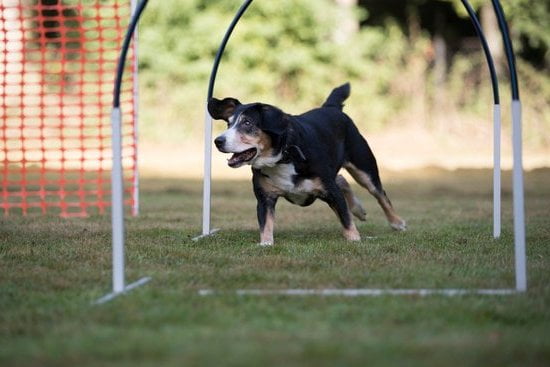Are you interested in pursuing a career as a dog trainer in California? If so, you’re in luck. This article will guide you on how to become a dog trainer in California, including the qualifications and certifications required, different training programs available, gaining hands-on experience, building a successful business, staying updated with the latest techniques, networking with other professionals, and considering ethical and legal considerations.
California has a high demand for professional dog trainers due to the large population of pet owners who are seeking assistance for their furry companions. Whether it be obedience training, behavioral modification, or specialized services for working dogs, the need for skilled trainers continues to grow.
So if you have a passion for working with animals and want to make a positive impact on the lives of both pets and their owners, becoming a dog trainer in California may be the perfect career path for you.
In order to become a successful dog trainer in California, it is essential to understand the qualifications and certifications required. Additionally, exploring various training schools and programs available in the state can provide valuable education and hands-on experience. With the right knowledge and skills, along with dedication and hard work, you can build a thriving business and make a difference in the lives of dogs and their owners across California.
Understanding the Qualifications and Certifications Required to Become a Dog Trainer in California
Becoming a professional dog trainer in California requires a certain level of qualifications and certifications to ensure that you are well-prepared to handle the responsibilities of training dogs. Here are some key requirements to consider when pursuing a career as a dog trainer in the state:
Education and Training
To become a certified dog trainer in California, it is essential to have a strong foundation in animal behavior, psychology, and training techniques. Pursuing educational programs such as animal science, veterinary studies, or specialized dog training courses can provide you with the knowledge and skills needed to effectively train dogs.
Professional Certifications
Obtaining certifications from recognized organizations such as the Certification Council for Professional Dog Trainers (CCPDT) or the International Association of Animal Behavior Consultants (IAABC) can help validate your expertise and credibility as a dog trainer. These certifications often require passing exams and demonstrating practical skills in dog training.
Licensing Requirements
In California, there may be specific licensing requirements for professional dog trainers, depending on the services offered. It is important to research and understand the local regulations and ensure compliance with any necessary licenses or permits required to operate as a dog trainer.
By fulfilling these qualifications and certifications, aspiring dog trainers can demonstrate their commitment to professionalism and excellence in the field of dog training. Continuously seeking opportunities for further education and skill enhancement will also contribute to building a successful career as a dog trainer in California.
Exploring the Different Training Schools and Programs Available in California
Becoming a professional dog trainer in California requires not only a passion for animals, but also the right education and training. Fortunately, there are various training schools and programs available throughout the state that can provide individuals with the knowledge and skills needed to succeed in this career.
Evaluating Accredited Training Schools
When seeking a program to become a certified dog trainer in California, it’s important to look for schools that are accredited by reputable organizations, such as the Certification Council for Professional Dog Trainers (CCPDT) or the International Association of Animal Behavior Consultants (IAABC). These accreditations ensure that the curriculum meets industry standards and that graduates are well-prepared for their careers.
Choosing the Right Program for You
There are different types of training programs available, including online courses, vocational schools, and university programs. Each option has its own set of advantages and disadvantages, so it’s essential to consider factors such as cost, time commitment, and teaching methodology when making a decision. Additionally, some programs may specialize in specific areas of dog training, such as obedience training or behavioral modification.
Hands-on Learning Opportunities
In addition to classroom instruction, many dog training programs in California offer hands-on learning opportunities through internships or apprenticeships with experienced trainers. These practical experiences can be invaluable for gaining real-world skills and building a network within the industry. Some programs may also provide access to facilities equipped with training equipment and resources for students to practice their techniques.
By researching and evaluating the different training schools and programs available in California, aspiring dog trainers can find the best fit for their career goals and begin their journey towards becoming certified professionals in the field.
Gaining Hands-on Experience Through Apprenticeships and Internships in the State
Becoming a skilled and successful dog trainer in California requires more than just acquiring knowledge from training schools and programs. Gaining hands-on experience through apprenticeships and internships is essential for honing your skills and understanding the practical aspects of working with dogs. Here are some ways you can gain valuable experience in the field:
- Volunteer at local animal shelters or rescue organizations: Volunteering at these facilities will give you the opportunity to work with a variety of dogs, gain experience in handling different temperaments, and learn about common behavioral issues.
- Seek mentorship from established dog trainers: Connecting with experienced dog trainers in California can provide you with invaluable guidance and insights. You can ask to shadow them during training sessions or seek opportunities to assist them in their work.
- Apply for internships at dog training facilities: Many dog training businesses and facilities offer internship programs for individuals looking to gain practical experience. This hands-on approach allows you to apply the knowledge you’ve learned in a real-world setting.
By actively seeking opportunities to immerse yourself in the field, you can develop the skills and confidence needed to become a competitive dog trainer in California.
Additionally, gaining hands-on experience through apprenticeships and internships not only enhances your expertise but also provides you with valuable networking opportunities. Building connections within the professional dog training community in California can open doors to future career prospects, client referrals, and collaboration opportunities. It’s important to establish relationships with other professionals in the industry as they can offer support, advice, and potential job leads down the line.
Tips for Building a Successful Dog Training Business in California
Building a successful dog training business in California requires a combination of skills, experience, and dedication. To start, it is essential to obtain the necessary qualifications and certifications to demonstrate your expertise and knowledge in dog training. There are various organizations such as the Certification Council for Professional Dog Trainers (CCPDT) or the International Association of Canine Professionals (IACP) that offer certifications that are recognized in California.
In addition to formal education and certification, gaining hands-on experience through apprenticeships and internships can be invaluable. Working under the guidance of experienced trainers allows you to learn different training techniques, understand canine behavior, and develop your own unique approach to training.
When starting your own dog training business in California, it is important to decide on a niche or specialty. This could be anything from basic obedience training for puppies to addressing behavioral issues in rescue dogs. Understanding your target market and tailoring your services to their needs can help set you apart from competitors.
Furthermore, staying updated with the latest training techniques and methods is crucial in the ever-evolving field of dog training. This involves attending workshops, seminars, or continuing education programs to continuously improve your skills and knowledge. Additionally, networking with other professional dog trainers in California can provide opportunities for collaboration, mentorship, and referrals.
| Qualifications | Certifications |
|---|---|
| Formal education and certification | Organizations like CCPDT or IACP |
| Hands-on experience through apprenticeships and internships | Learning different training techniques |
| Deciding on a niche or specialty | Tailoring services to target market |
| Staying updated with latest techniques & methods | Networking with professional dog trainers |
The Importance of Staying Updated With the Latest Training Techniques and Methods
As a dog trainer in California, it is crucial to stay updated with the latest training techniques and methods to provide the best possible service to your clients and their furry companions. With the ever-evolving understanding of animal behavior and learning, it is essential to stay current with new strategies that can improve training outcomes and create a more positive experience for both dogs and their owners.
One of the best ways to stay updated on the latest training techniques is by attending workshops, seminars, and conferences specifically focused on dog training. These events often feature renowned experts in the field who share their knowledge and expertise on innovative methods for behavior modification, obedience training, and problem-solving with challenging behaviors. Additionally, taking advanced courses or obtaining specialized certifications in specific areas of dog training can also help you stay at the forefront of industry advancements.
Furthermore, staying connected with professional organizations and online resources can provide valuable insights into emerging trends and best practices in dog training. Joining groups or forums where trainers share their experiences, discuss new approaches, and seek advice can be beneficial for keeping up-to-date with industry developments. Being an active member of these communities allows you to learn from others’ experiences and contribute your own expertise, creating a network of support and learning opportunities within the dog training community.
Networking and Connecting With Other Professional Dog Trainers in California
Networking with other professional dog trainers in California is essential for staying up to date with the latest training techniques and methods, sharing experiences, and building a support system within the industry. By connecting with other professionals in the field, you can gain valuable insights and advice that can help you further your career as a dog trainer.
Here are some ways you can start networking with other professional dog trainers in California:
1. Join local and national associations: Consider joining organizations such as the Association of Professional Dog Trainers (APDT), International Association of Canine Professionals (IACP), or the National K-9 Learning Center. These associations often hold conferences, workshops, and events where you can meet and connect with other dog trainers in California.
2. Attend seminars and workshops: Keep an eye out for seminars and workshops hosted by experienced trainers in California. These events provide great opportunities to network, learn from others, and make valuable connections within the industry.
3. Utilize social media: Join online communities related to dog training on platforms like Facebook, LinkedIn, or specialized forums. Engage in discussions, share your experiences, and connect with fellow professionals in your area.
By actively participating in these networking opportunities, you can expand your contacts within the dog training community in California and stay informed about industry trends and best practices. This will not only enhance your skills as a trainer but also open doors to potential collaborations or partnerships that can benefit your career in dog training.
Remember that networking is an ongoing process that requires active participation and genuine interest in building relationships with other professionals. By engaging with others in the field, you can create a strong support system while also contributing to the growth of the dog training community in California.
Discussing the Ethical and Legal Considerations for Dog Trainers in the State
Becoming a dog trainer in California is an exciting and rewarding career choice, but it’s important to understand the ethical and legal considerations that come with this profession. As a professional dog trainer, you have a responsibility to ensure the well-being of the animals in your care, as well as adhere to the laws and regulations governing animal training in the state.
One of the most important ethical considerations for dog trainers in California is ensuring the humane treatment of all animals. This means using positive reinforcement techniques, avoiding any form of physical or psychological abuse, and always putting the safety and welfare of the dogs first. Additionally, respecting client confidentiality and maintaining professionalism at all times are key ethical principles for dog trainers.
From a legal perspective, dog trainers in California must be aware of any relevant laws and regulations that apply to their work. This includes understanding animal welfare laws, business licensing requirements, liability issues, and any specific rules related to animal training facilities. It’s crucial for aspiring dog trainers to familiarize themselves with these legalities before starting their practice.
Ensuring ethical conduct and compliance with legal requirements not only protects the dogs under a trainer’s care but also contributes to maintaining a positive reputation for the profession as a whole. By upholding high ethical standards and staying informed about relevant laws, dog trainers can build trust with clients, establish credibility within the industry, and contribute to the overall well-being of canine companions across California.
| Ethical Considerations | Legal Considerations |
|---|---|
| Using positive reinforcement techniques | Understanding animal welfare laws |
| Maintaining professionalism | Business licensing requirements |
| Respecting client confidentiality | Liability issues |
Conclusion and Encouragement to Pursue a Career as a Dog Trainer in California
In conclusion, pursuing a career as a dog trainer in California can be a fulfilling and rewarding endeavor. With the increasing demand for professional dog trainers in the state, there are ample opportunities to make a meaningful impact on the lives of canine companions and their owners.
By understanding the qualifications and certifications required, exploring different training schools and programs, gaining hands-on experience through apprenticeships and internships, and staying updated with the latest training techniques, aspiring dog trainers can set themselves up for success in California.
One of the key aspects of becoming a successful dog trainer in California is to build a strong network within the professional community. Connecting with other professional dog trainers in the state can provide valuable insights, support, and potential collaboration opportunities. Additionally, staying abreast of ethical and legal considerations for dog trainers is crucial for maintaining professionalism and integrity in this field.
Ultimately, anyone passionate about working with dogs has the opportunity to turn their love for animals into a fulfilling career as a dog trainer in California. By following the outlined steps, continuously learning and growing within the industry, and building meaningful connections within the community of dog trainers in the state, individuals can embark on a successful journey towards becoming a respected professional dog trainer in California.
Frequently Asked Questions
Do Dog Trainers Need a License in California?
In California, dog trainers do not need a specific license to practice. However, obtaining certification from reputable organizations can enhance credibility and qualifications in the field.
Can You Make a Lot of Money as a Dog Trainer?
The potential to make a lot of money as a dog trainer largely depends on factors such as experience, expertise, location, and client base. While some dog trainers may earn a substantial income, others may have more modest earnings.
What Dog Trainer Certification Is Best?
The best dog trainer certification is subjective and depends on the individual’s career goals and specialization. Some well-regarded certifications include CPDT-KA (Certified Professional Dog Trainer – Knowledge Assessed) and KPA-CTP (Karen Pryor Academy Certified Training Partner). Researching each program’s curriculum, requirements, and reputation is crucial in determining the best fit.

Welcome to the blog! I am a professional dog trainer and have been working with dogs for many years. In this blog, I will be discussing various topics related to dog training, including tips, tricks, and advice. I hope you find this information helpful and informative. Thanks for reading!





